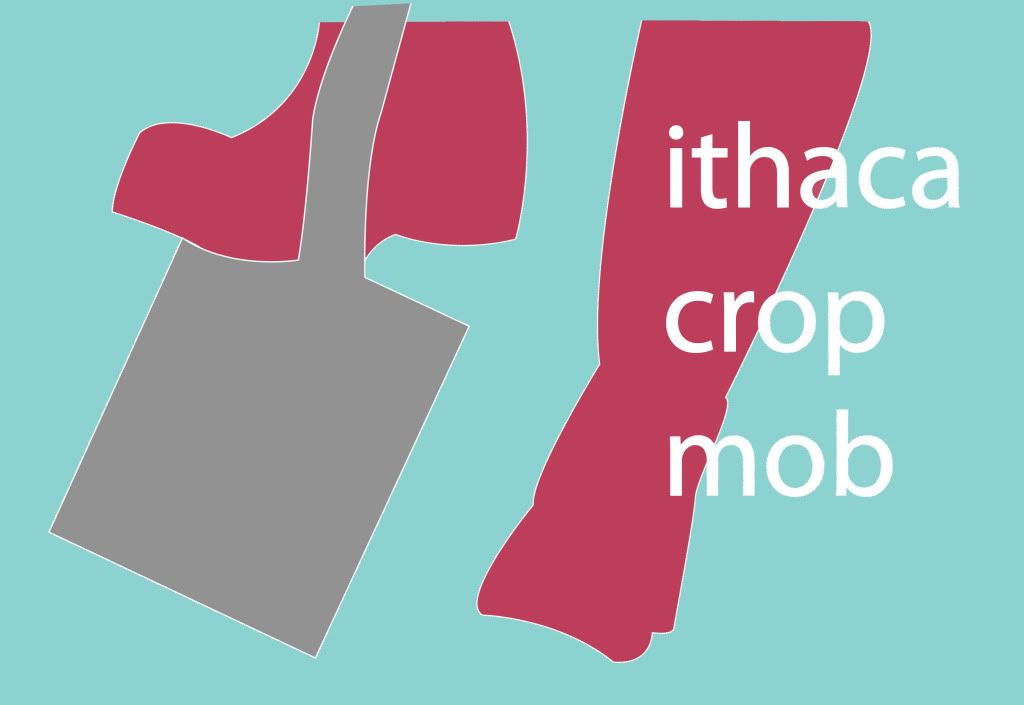In seed time learn, in harvest teach, in winter enjoy.
-William Blake
-William Blake
Autumn's bright leaves and brisk winds have returned to the Finger Lakes. The first freeze struck this month, wiping out the very end of the tomatoes and basil (if blight hadn't gotten there first), beans, eggplants, squash, and more. But October was hardly a slow fade into winter- seventy degree days followed bitter cold sleet in a roller-coaster pattern that left plants as weary as farmers were wary. Now is the time to put the land to rest for the winter- even if, as in West Haven's case, the farmers won't get a break!
This month, the Crop Mob visited West Haven Farm at Ecovillage in Ithaca, NY, ready to embark on the fall cleaning and complete the cycle of the growing season. We began by pulling up the black plastic mulch- weed controller and soil warmer- from the squash beds, exposing irrigation tubes for later removal.
The plastic pile!
Once we'd finished stripping the beds of plastic, we moved on to the tomatoes. West Haven uses a variation on tomato staking called Florida Weave, or "stake and weave," an efficient way of trellising many plants in a long, straight line. West Haven's crew had placed stakes every 5 or so feet and threaded cord between the wooden stakes at several different levels, the cord weaving around the plants so they are supported on both sides as they climb up for support. Wooden stakes were then fastened to larger metal stakes with thick, sturdy cording for stability. Wielding various cutting tools, we moved along the beds cutting the twine from the stakes, allowing the walls of tomato plants to fall gently to the ground. Later a West Haven crew would remove the plastic underneath.
John Bokaer-Smith followed behind, pulling up deeply lodged metal stakes with a handy t-post puller! It works by hooking onto the metal posts, then using a lever to lift them straight upward. The power of tools!!
The plastic-free squash field...
Stray eggplants and peppers were gleaned by our crop mobbers to take home as we went along. Yum!
Next we split up- a couple of us stayed in the field to collect stakes, and the rest of us followed John to the hoophouse to clear out more peppers.
A field's worth of stakes...
The prolific pepper plants- their work here is done.
The cleared-out hoophouse. Very appealing to one's sense of order!
After the stakes were all accounted for and the pepper plants pulled, we yielded to the light rain and took shelter in West Haven's roomy barn, where their CSA pickup is held and produce sorted. Our next task- cleaning garlic!
The garlic was stored, uncleaned, to cure in midsummer. John sets up bins for uncleaned, trimmed, and cleaned garlic down the table for the assembly line.John explaining how to clean garlic. Step 1: Trim the unruly roots; 2. Rub the skins to remove dirty layers of skin (being careful not to expose the cloves); and 3. Admire your work!
At lunchtime, Jen Bokaer-Smith greeted grateful mobbers in the barn with warm, hearty bowls of soup (veggie or omniv), garlic bread, and apple crisp. Over lunch, Jen and John told us a bit about their farm's history. West Haven, along with 80% of Ecovillage's land, is protected from development indefinitely under a permanent conservation easement held by the Finger Lakes Land Trust. They also shared with us the story of their long and challenging history with deer on the farm. Not having realized the complications of clearing and using land that was located right in the middle of a deer trail, the Bokaers faced extensive deer damage to their crops until finally erecting a formidable (and expensive) fence tall enough (over 8 ft!) to keep them from jumping in. John, a longtime vegetarian, shared an anecdote of vengefully ordering venison soup at a restaurant in a moment of extreme frustration, only to receive a call mid-meal about a fire at EcoVillage, triggering in him a feeling of severe, if totally unjustified, guilt!
After lunch, farm manager Todd McLane gave us a tour of the rest of the farm's 10 acres of organic vegetables and fruit, including the young apple and peach trees, some cool-weather crops, and the greenhouses, which will be used for greens for winter markets.
Broccoli thriving in the cool temperatures...
The organic orchard is a rarity, as it's extremely difficult to control pests, but West Haven proves that it can be done!
Sudangrass cover crop, enriching the soil for next year.
Thanks to our band of crop mobbers for joining us for our October mob, one of the last events of the year! Our deepest gratitude to West Haven Farm for having us, feeding us, and providing a great educational experience to boot!
We hope you'll join us for our November mob, a carrot harvest at Stick and Stone Farm in Ithaca, which, sadly, looks like it will be the last one of the season! Not to worry, though- we'll be back in the fields again in the spring!
Keep warm,
Rachel


















What a mob! You gals and guys are awesome!
ReplyDelete